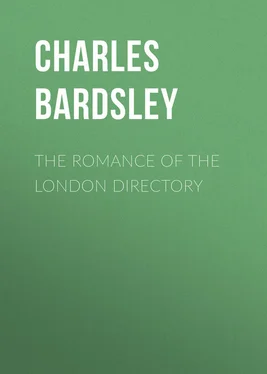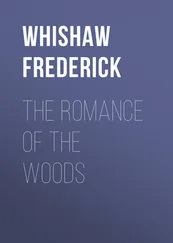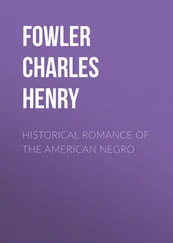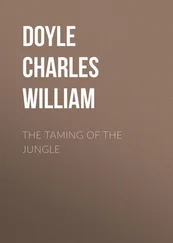Charles Bardsley - The Romance of the London Directory
Здесь есть возможность читать онлайн «Charles Bardsley - The Romance of the London Directory» — ознакомительный отрывок электронной книги совершенно бесплатно, а после прочтения отрывка купить полную версию. В некоторых случаях можно слушать аудио, скачать через торрент в формате fb2 и присутствует краткое содержание. Жанр: foreign_antique, foreign_prose, на английском языке. Описание произведения, (предисловие) а так же отзывы посетителей доступны на портале библиотеки ЛибКат.
- Название:The Romance of the London Directory
- Автор:
- Жанр:
- Год:неизвестен
- ISBN:нет данных
- Рейтинг книги:5 / 5. Голосов: 1
-
Избранное:Добавить в избранное
- Отзывы:
-
Ваша оценка:
- 100
- 1
- 2
- 3
- 4
- 5
The Romance of the London Directory: краткое содержание, описание и аннотация
Предлагаем к чтению аннотацию, описание, краткое содержание или предисловие (зависит от того, что написал сам автор книги «The Romance of the London Directory»). Если вы не нашли необходимую информацию о книге — напишите в комментариях, мы постараемся отыскать её.
The Romance of the London Directory — читать онлайн ознакомительный отрывок
Ниже представлен текст книги, разбитый по страницам. Система сохранения места последней прочитанной страницы, позволяет с удобством читать онлайн бесплатно книгу «The Romance of the London Directory», без необходимости каждый раз заново искать на чём Вы остановились. Поставьте закладку, и сможете в любой момент перейти на страницу, на которой закончили чтение.
Интервал:
Закладка:
1. (15th Eliz.) Quyntine Sneydon of Gringley Manor.
2. (20th Eliz.) Quintin Snaneton of Grinley Manor.
3. (25th Eliz.) Quyntin Sneyton of Grynley Manor.
Thus there are three distinct variations of Christian name, surname, and place of residence, – nine in all, when only nine were possible! This, too, in a formal legal document. Take another instance given to me by J. Paul Rylands, F.S.A. In Edward the Third’s reign lived one Henry le Machun by name. His son was Adam le Machoun. Passing downwards, his descendants are found as Macound, Macount, Macont, till in 1584 they are Macon, a year later Maconde. In 1592 they are Makant, and Makont, in 1609 Macante, in 1610 Makin, in 1620 Macond, in 1624 Meacon, in 1626 Meakin, in 1644 Macant, in 1650 Meakyn. We are in a perfect wilderness by the time the last entry is reached, – and thus some of our present Makins, instead of deriving their surname from Makin, the once pet name of Matthew, may be descended from Mason, which, belonging to a totally different class, owes its existence to the occupation of its first bearer. Thus, as we turn over the pages of the London Directory, we are being ever struck by the many guises under which one single name may appear. It is palpable to the most uninitiated that Langwith, Langworth, and Langworthy are all the same, and that all may have had the same common ancestor. The merest tyro in nomenclatural knowledge must recognise at a glance that Gibbins, Gibbings, and Gibbons are one and the same name, and that Smithers, Smithies, and Smithyes may have boasted a common progenitor. There is no Raleigh in the London Directory. Has, then, Sir Walter no representative? Yes, for there are three Rawleys, who have learnt to spell their name as it was pronounced three centuries ago. But how do we know Sir Walter’s name was pronounced like Rawley? The following skit was written at the poet’s expense by a contemporary critic, who attacked his supposed atheistic notions. We may premise that Walter was always pronounced Water then.
“ Water thy plants with grace divine,
And hope to live for aye:
Then to thy Saviour Christ incline,
In Him make stedfast stay.
Raw is the reason that doth lie
Within an atheist’s head,
Which saith the soul of man doth die,
When that the body’s dead.
Now may you see the sudden fall
Of him that thought to climb full high;
A man well known unto you all,
Whose state, you see, doth stand Rawly .”
The last word is supposed to mean “rarely,” and thus a double pun is attempted, both proving the name to have been pronounced in a fashion not common now.
But while these names can be traced to their true source and meaning, it is not so with others. Take the following from the London Directory: – “Six,” “Seven,” “Nine,” “Spon,” “Spitty,” “Kiss,” “Slape,” “Im,” “Ey,” “Tattoo,” “Tubby,” “Yewd,” “Zox,” “Toop,” “Kitcat,” “Sass,” “Knags,” “Neeb,” “Siggs,” “Saks,” “Toy,” “Stidd,” “Stap,” and “Shum,” – what do they mean? Whence came they? Ask the bearers, and they will say, no doubt, that they came over with William the Conqueror. They are not the only people who have tried to come William the Conqueror over us.
In this last list we have mentioned “Kiss.” This reminds me that there is one instance in the same tome much more demonstrative than that – namely, “Popkiss”! But there is no difficulty in deciphering this, as it is a manifest corruption of Popkins, and that of Hopkins. The Directory teems with examples of the termination kins being turned into kiss and again into ks . Thus we have not merely Perkins, but Perkiss and Perks – not only Hodgkins, but Hotchkiss – not alone Wilkins, but Wilks; and so oh with many others.
While some surnames are hopelessly corrupted, and therefore incapable of interpretation, others are a stumbling-block because they seem so easily explainable. Such are names like “Coward,” “Craven,” and “Charley.” The “Coward,” or Cowherd, was a tender of kine; “Craven” is local; and “Charley” is the same. “Deadman” and “Dedman” are, like “Debnam,” but corruptions of “Debenham,” and therefore local also. “Tiddyman” looks as if its first bearer had been tidy in his habits; but it was once a Christian name, and therefore is a patronymic. “Massinger” has been not uncommonly explained as Mass-singer. Of course it is the early form of “Messenger.” “Diamond” is a form of “Dumont,” and “Doggrell” of “Duckerell” – that is, little duck, a manifest nickname. “Eatwell” and “Early” are also both of local origin. “Portwine” is first found as “Poitevin,” the old name for an inhabitant of Poictiers; and “Coleman,” though apparently connected with the black diamond, is an early baptismal name. There is a peculiar tendency to skip the natural solution, and go to the Continent, especially Normandy, for the origin. Thus “Twopenny,” a palpable relic of the twopenny piece, and twopenny ale, is represented as hailing from Tupigny in Flanders. “Death” is said to be from D’Aeth in the same; “Bridges” from Bruges; and “Morley” from Morlaix, where lived St. Bernard – regardless of the fact that there are a dozen hamlets styled “Morley” in England; indeed, wherever there is a moorland reach there is a village or farm styled “Morley.”
A lady wrote to me the other day to inform me that I had made a mistake in ascribing the name “Mason” to the craftsman of that name, for she was sure she was sprung from Mnason in the Acts of the Apostles, and that the family had worked its way through Phrygia, and Italy, and Germany, into England. If she can prove her pedigree, she may boast a genealogy which the proudest monarch in Europe might envy. The fact is, it is as true of a hundred reputed foreign names as of the rhyme of the three Devonshire families, which asserts that
“‘Croker,’ ‘Crewys,’ and ‘Coplestone,’
When the Conqueror came were at home.”
What a pleasant book to look upon would our Directory be if we had all had the selection of our own surnames! There would have been no “Pennyfathers.” This was an old English nickname for a miser. An old couplet says, —
“The liberall doth spend his pelfe,
The pennyfather wastes himself.”
That such a disposition need not be hereditary is proved in the case of one of the most generous, earnest Christian ministers who ever worked for Christ in London. Mr. Pennefather is dead; but who would think of connecting him with the characteristic his name implies? Again, there would have been no “Piggs,” no “Rakestraws” (an old nickname for a dust-heap searcher), no “Milksops,” no “Buggs,” no “Rascals.” But the fact is, the man who had most interest in the matter had least to do with it. All he could do was to accept his sobriquet, if not with thanks, with such grace as he could muster. If his children could shuffle it off, so much the better. Our Directory proves that this was not always possible. ’Tis true, we have got rid of “Alan Swet-in-bedde’s” nominal descendants, not to mention such cognomens as “Cheese-and-bread,” “Scutel-mouth” (what a great eater he must have been!) “Red-herring,” “Drink-dregs,” “Cat’s-nose,” “Pigg’s-flesh,” “Spickfat” ( i. e. bacon-fat), “Burgulion” (a braggart), and “Rattlebag.” But many of these names made a hard fight for it, and contrived to hold out till the seventeenth, or even eighteenth, century. “Piggs-flesh,” I say, is gone; but “Hog’s-flesh” has been a name familiar to Brighton and its neighbourhood for six hundred years, and still lives. Charles Lamb’s little comedy, called “Mr. H. – ” ( i. e. , Hog’s-flesh), had for its hero’s sobriquet no fanciful title. No doubt Mr. Lamb had seen the name in a Sussex Directory. The story is a relation of Mr. H.’s troubles in polite society through the attempt to hide his name under the mere initial. When it is discovered, everybody deserts him. As he quits his hotel, his landlord says: —
Читать дальшеИнтервал:
Закладка:
Похожие книги на «The Romance of the London Directory»
Представляем Вашему вниманию похожие книги на «The Romance of the London Directory» списком для выбора. Мы отобрали схожую по названию и смыслу литературу в надежде предоставить читателям больше вариантов отыскать новые, интересные, ещё непрочитанные произведения.
Обсуждение, отзывы о книге «The Romance of the London Directory» и просто собственные мнения читателей. Оставьте ваши комментарии, напишите, что Вы думаете о произведении, его смысле или главных героях. Укажите что конкретно понравилось, а что нет, и почему Вы так считаете.












